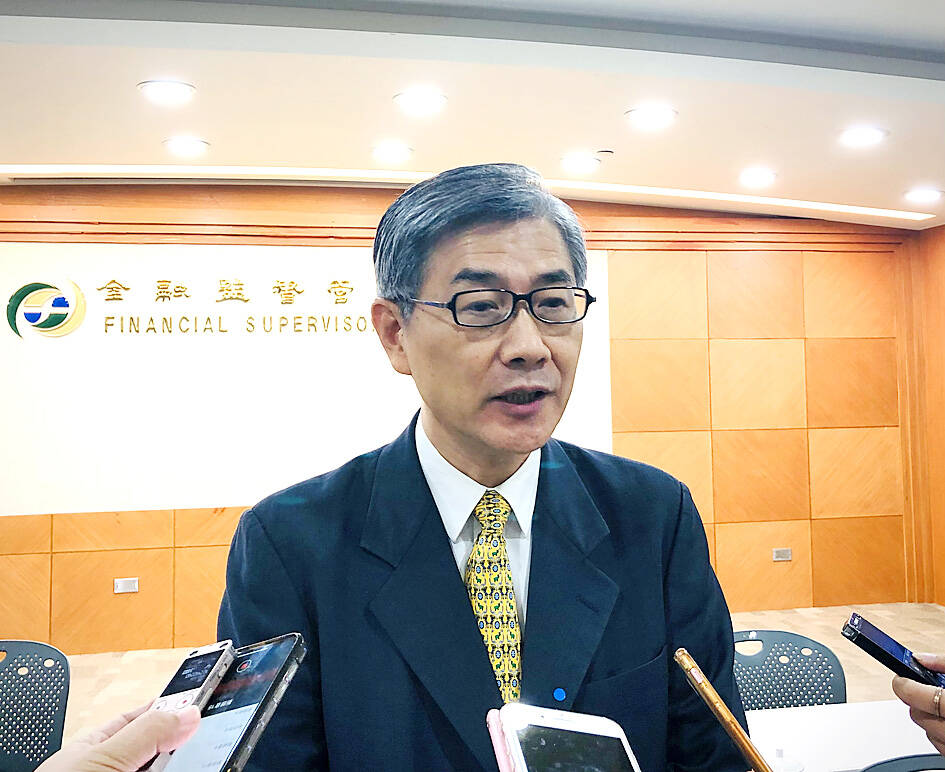Draft legislation proposed by the Financial Supervisory Commission (FSC) to curb major shareholders from improperly interfering in the operations of financial holding companies and banks would limit penalties on offenders to just fines, local media reported, citing commission officials.
The bill would also remove fines on persons in charge of financial holding companies and banks should improper interference by major shareholders occur, while retaining sanctions such as salary cuts, suspensions and dismissals, the officials said.
The FSC submitted the draft amendments to the Financial Holding Company Act (金融控股公司法) and the Banking Act (銀行法) to the Executive Yuan for review this month, they said.

Photo: Kelson Wang, Taipei Times
The commission expects the draft legislation to be considered among the priority bills that could be deliberated in the Legislative Yuan in the coming months, they said.
In a previous draft seen in April, the regulator proposed penalties against major shareholders who improperly interfered in the operations of a holding company or bank in the form of fines of up to NT$50 million (US$1.55 million), restrictions on their voting rights or requirements that they sell their shares.
The bill comes as several financial holding firms’ major shareholders were found to have improperly intervened in company operations by receiving information directly from management rather than from their representatives on the board, or by holding meetings outside the office with responsible executives.
Since last year, the commission has imposed sanctions on Shin Kong Financial Holding Co (新光金控), China Development Financial Holding Corp (中華開發金控) and CTBC Financial Holding Co (中信金控) for failing to comply with corporate governance requirements and keep those in power to behave properly.
The commission’s previous draft faced strong objections from the financial industry, with major shareholders criticizing the equity divestment penalties as infringing on their property rights, while executives of financial companies demanded that the principle of proportionality be observed regarding the fines of up to NT$50 million.
After discussions with legal experts and financial professionals over the past few months, the commission adjusted the scope of the penalties to ensure the legislation would pass smoothly, the officials said.
FSC Chairman Thomas Huang (黃天牧) has said that the commission hoped to receive public support by achieving its policy goal in stages.
It remains to be seen whether a fine of as high as NT$50 million can effectively constrain the conduct of major shareholders who seem to care less about money than power, analysts said.
What matters more are harsher penalties like voting rights restrictions and equity divestment requirements, they said.

To many, Tatu City on the outskirts of Nairobi looks like a success. The first city entirely built by a private company to be operational in east Africa, with about 25,000 people living and working there, it accounts for about two-thirds of all foreign investment in Kenya. Its low-tax status has attracted more than 100 businesses including Heineken, coffee brand Dormans, and the biggest call-center and cold-chain transport firms in the region. However, to some local politicians, Tatu City has looked more like a target for extortion. A parade of governors have demanded land worth millions of dollars in exchange

An Indonesian animated movie is smashing regional box office records and could be set for wider success as it prepares to open beyond the Southeast Asian archipelago’s silver screens. Jumbo — a film based on the adventures of main character, Don, a large orphaned Indonesian boy facing bullying at school — last month became the highest-grossing Southeast Asian animated film, raking in more than US$8 million. Released at the end of March to coincide with the Eid holidays after the Islamic fasting month of Ramadan, the movie has hit 8 million ticket sales, the third-highest in Indonesian cinema history, Film

Taiwan Semiconductor Manufacturing Co’s (TSMC, 台積電) revenue jumped 48 percent last month, underscoring how electronics firms scrambled to acquire essential components before global tariffs took effect. The main chipmaker for Apple Inc and Nvidia Corp reported monthly sales of NT$349.6 billion (US$11.6 billion). That compares with the average analysts’ estimate for a 38 percent rise in second-quarter revenue. US President Donald Trump’s trade war is prompting economists to retool GDP forecasts worldwide, casting doubt over the outlook for everything from iPhone demand to computing and datacenter construction. However, TSMC — a barometer for global tech spending given its central role in the

Alchip Technologies Ltd (世芯), an application-specific integrated circuit (ASIC) designer specializing in server chips, expects revenue to decline this year due to sagging demand for 5-nanometer artificial intelligence (AI) chips from a North America-based major customer, a company executive said yesterday. That would be the first contraction in revenue for Alchip as it has been enjoying strong revenue growth over the past few years, benefiting from cloud-service providers’ moves to reduce dependence on Nvidia Corp’s expensive AI chips by building their own AI accelerator by outsourcing chip design. The 5-nanometer chip was supposed to be a new growth engine as the lifecycle